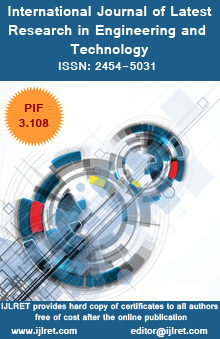Vol. 09, No. 01 [January 2023]
- Citation
- Abstract
- Reference
- PDF Download
| Paper Title | :: | Operational challenges in wastewater treatment - possibilities for improving the operation |
| Author Name | :: | Tamas Papp |
| Country | :: | Hungary |
| Page Number | :: | 01-04 |
This research is focused on the use of process control in wastewater treatment systems, with a specific emphasis on aeration control, recirculation stream control, and chemical addition control. The paper covered mathematical background of process control, including the use of differential equations, linear and nonlinear systems, feedback control, and PID control. It also provided information on how to adjust process control by tuning the K parameters, how to optimize the performance of aeration, recirculation stream and chemical addition control by using advanced control strategies such as model predictive control, adaptive control, or optimal control.
Key Words: activated sludge system, operation, process control, wastewater treatment
Key Words: activated sludge system, operation, process control, wastewater treatment
[1]. Sun, J., Dai, X., Wang, Q., van Loosdrecht, M. C., & Ni, B. J. (2019). Microplastics in wastewater treatment plants: Detection, occurrence and removal. Water research, 152, 21-37.
[2]. Ziajahromi, S., Neale, P. A., Rintoul, L., & Leusch, F. D. (2017). Wastewater treatment plants as a pathway for microplastics: development of a new approach to sample wastewater-based microplastics. Water research, 112, 93-99.
[3]. Guo, Y., Qi, P. S., & Liu, Y. Z. (2017, May). A review on advanced treatment of pharmaceutical wastewater. In IOP Conference Series: Earth and Environmental Science (Vol. 63, No. 1, p. 012025). IOP Publishing.
[4]. Karches, T. (2012). Evaluation of mixing efficiency in coagulation-flocculation process in wastewater treatment. Journal of Environmental Science and Engineering. A, 1(7A), 898.
[5]. Solon, K., Volcke, E. I., Spérandio, M., & Van Loosdrecht, M. C. (2019). Resource recovery and wastewater treatment modelling. Environmental Science: Water Research & Technology, 5(4), 631-642.
[2]. Ziajahromi, S., Neale, P. A., Rintoul, L., & Leusch, F. D. (2017). Wastewater treatment plants as a pathway for microplastics: development of a new approach to sample wastewater-based microplastics. Water research, 112, 93-99.
[3]. Guo, Y., Qi, P. S., & Liu, Y. Z. (2017, May). A review on advanced treatment of pharmaceutical wastewater. In IOP Conference Series: Earth and Environmental Science (Vol. 63, No. 1, p. 012025). IOP Publishing.
[4]. Karches, T. (2012). Evaluation of mixing efficiency in coagulation-flocculation process in wastewater treatment. Journal of Environmental Science and Engineering. A, 1(7A), 898.
[5]. Solon, K., Volcke, E. I., Spérandio, M., & Van Loosdrecht, M. C. (2019). Resource recovery and wastewater treatment modelling. Environmental Science: Water Research & Technology, 5(4), 631-642.
- Citation
- Abstract
- Reference
- PDF Download
| Paper Title | :: | Professional Issues in Software Engineering: The Perspective of Uganda |
| Author Name | :: | Ivan Niyonzima || Paul Mukasa Ssemaluulu || Doreen Atukunda || Aureri Akankwasa |
| Country | :: | Uganda |
| Page Number | :: | 05-08 |
The research paper is dedicated to investigating legal and professional issues in Uganda's software engineering industry. The paper reflects on academic perspectives on the issue and the lack of relevant academic publications that overview the causality behind the software engineering problems in Uganda. The limited amount of literature on the topic that does exist presents a roadmap to solve the challenges potentially. The overview of the software engineering industry of Uganda is presented. Professional issues that are discussed in the paper include not conducting Requirements Engineering Process Improvement, low quality of practical software engineering education in the universities, lack of adherence to international standards, poor career development, and engineers focusing on seeking foreign jobs. Legal issues include a lack of implementation of the relevant law, multi-sector corruption, and the challenges related to the ease of doing business. The research concludes that the multi-dimensional approach that involves state, academia, and companies has to be used to solve the underlying issues.
Key Words: IT industry, software engineering, software development, developing countries, developers, engineers, corruption, outsourcing.
Key Words: IT industry, software engineering, software development, developing countries, developers, engineers, corruption, outsourcing.
[1]. Andela lays off 400 software developers in Uganda, Nigeria. (2019). Retrieved 18 January 2020, from https://observer.ug/businessnews/62011-andela-lays-off-400-software-developers-in-uganda-nigeria
[2]. Ease of Doing Business in Uganda. (2020). Retrieved 18 January 2020, from https://tradingeconomics.com/uganda/ease-of-doing-business
[3]. conomy Profile Uganda: Doing Business 2020. (2020). Retrieved 18 January 2020, from https://www.doingbusiness.org/content/dam/doingBusiness/country/u/uganda/UGA.pdf
[4]. ICT Sector Profile. (2016). Retrieved 18 January 2020, from https://www.ugandainvest.go.ug/ict-sector-profile-2/
[5]. Kabaale, E., Kituyi, G. M., & Mbarika, I. (2014). Requirements engineering process improvement challenges faced by software SMEs in Uganda. International Journal of Computer Applications, 88(5), 20-25.
[2]. Ease of Doing Business in Uganda. (2020). Retrieved 18 January 2020, from https://tradingeconomics.com/uganda/ease-of-doing-business
[3]. conomy Profile Uganda: Doing Business 2020. (2020). Retrieved 18 January 2020, from https://www.doingbusiness.org/content/dam/doingBusiness/country/u/uganda/UGA.pdf
[4]. ICT Sector Profile. (2016). Retrieved 18 January 2020, from https://www.ugandainvest.go.ug/ict-sector-profile-2/
[5]. Kabaale, E., Kituyi, G. M., & Mbarika, I. (2014). Requirements engineering process improvement challenges faced by software SMEs in Uganda. International Journal of Computer Applications, 88(5), 20-25.


